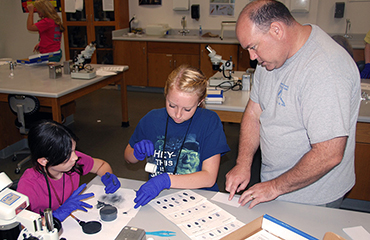 Registration to take part in Lander University's summer Science and Math program for students in grades five through 12 is available through May 31.
Registration to take part in Lander University's summer Science and Math program for students in grades five through 12 is available through May 31.
The application form can be found online. A letter of recommendation from the student's science or math teacher or guidance counselor is also required. The fee, $125 per session, covers all supplies and snacks and lunch in the Lander Dining Hall.
Sessions run Monday through Thursday, beginning at 9 a.m. and ending at 4:45 p.m.
Kicking off the program, made possible by a grant from Duke Energy, will be a forensics class, taught by Lander Professor of Biology Dr. T.D. Maze, who will demonstrate how DNA technology and other techniques are used to solve crimes. Students in the June 5-8 class will take part in a crime scene investigation and collect evidence to be presented in a mock trial.
From June 12-15, Dr. Farha Ali, Julie Henderson and Gina Dunn, professors of computing and mathematics at Lander, will examine the inner workings of computers in the session entitled, "Cybercamp: What's Under the Hood? Computers Demystified."
Students will make bottle rockets, soap, super balls, nylon rope, glue and other products in "The Magic of Chemistry," taught by Dr. Ralph Layland and Jack Burton. The chemistry of familiar consumer products found in the kitchen, grocery store and pharmacy is another topic that will be covered in the June 19-22 class.
In "2D Animation and Game Programming Using 'Scratch,'" offered June 26-29, Associate Professor of Computing Dr. Gilliean Lee will introduce an easy to use programming environment that enables participants to write computer programs for interactive 2D animation and computer games.
Professor of Physics Dr. David Slimmer will conduct a tour of some everyday phenomena, using hands-on demonstrations as the primary method of exploration, in the session entitled "Physics," which runs from July 10-13. Topics will include areas of chemistry and biology as well as several different areas of physics.
Participants will learn how to grow and study microbes, like bacteria and yeast, and explore how they can be both harmful and helpful, in "Microbes and Outbreaks," taught by Associate Professor of Biology Dr. Mark Pilgrim. Students in the July 17-20 class will collect specimens from a variety of places, including their own bodies, and also participate in a simulated disease outbreak.
Each of the programs is limited to 20 participants, with preference given to those who have not participated in the past.